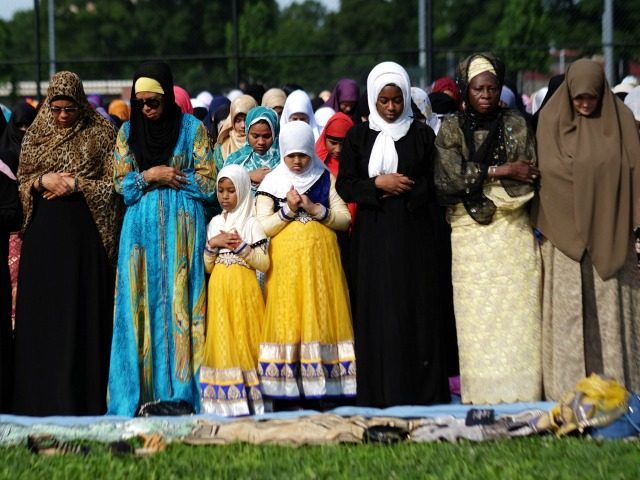Almost six of ten Americans say visitors and immigrants who support Islamic sharia ideology should be excluded from the country, according to the latest polling.
That could be good news for Donald Trump, who is urging a comprehensive reform of border and anti-jihad strategies to exclude many supporters of Islam’s sharia ideology from entering the United States.
The poll of 803 registered voters was conducted by OpinionSavvy, via telephone, using automated questions, and with a margin of error at 3.5 percent.
The pollsters’ question pushed past the media’s normal refusal to distinguish between Muslim people and Islamic ideology, by focusing its questions on Americans’ attitudes towards Islam’s sharia ideology.
First, the poll asked whether tourists and immigrants should be screened to check for their possible support of Islamic sharia. Seventy percent of respondents approved of the screening.
The poll then asked the 70 percent; “Do you believe that individuals who support the practice of [Islamic] Sharia law should be admitted into the United States?” No, responded four-fifths of the 70 percent. That translates into 56 percent of total respondents backing Trump’s proposed policy of excluding sharia-supporting Muslims.
The overall opposition to the exclusion of sharia supporters added up to just 20 percent, with the rest undecided.
That almost 3:1 voter split is good news for Trump’s border-reform anti-jihad strategy. In mid-June, for example, Trump declared that “Muslims [in America] have to work with us. They know what’s going on. They know that [Orlando gunman Omar Mateen] was bad. They knew the people in San Bernardino were bad. But you know what? They didn’t turn them in. And you know what? We had death and destruction.”
The “best way to prevent continued radicalization from developing inside America is to suspend temporarily immigration from regions that have been a major source for terrorists and their supporters coming to the U.S.,” Stephen Miller, Trump’s policy director, told The Wall Street Journal on June 27.
The popular support for the exclusion of radical Islamic ideology matches prior public support for excluding other foreign ideologies. For example, question 10 on the current N-400 immigration document still asks would-be immigrants a decades-old question: “Have you ever been a member of, or in any way associated (either directly or indirectly) with: A. The Communist Party? B. Any other totalitarian party? C. A terrorist organization?
The pollster also Americans whether they wanted visitors to accept the subordination of their foreign cultures to American culture while the visitors are in the nation; Do you believe that the United States government should require all foreign individuals [chiefly tourists, not immigrants] entering the United States to affirm that they will uphold the principles of the constitution, such as freedom of religion and speech, above all personal ideologies for the duration of their stay in the country?
Yes, said 78 percent of Americans. That’s almost eight out of every 10 people. No, said only 13.8 percent. That’s only one out of every seven people.
Again, that’s good news for Trump, whose Americans-first policy is opposed by Obama’s and Clinton’s support for imposed cultural diversity.
The pollster pushed farther; What is your opinion of a suggested policy that US citizens who pledge their allegiance to the Islamic State, also known as ISIS, or any other terrorist organization should no longer be considered citizens of the United States?
Sixty-six percent of respondents said they strongly backed a love-it-or-leave-it policy, while only 4 percent strongly supported letting ISIS supporters keep their citizenship. That’s a 15-to-one split.
Overall, the poll seems legitimate, with a reasonable proportion of men and women, a good distribution of people from each corner of the country, and a political skew that matches other polls — 25 percent Republican, 34 percent Democratic, 41 percent independent or other. The racial and religious composition matches the population, and it even included 15 Muslims, even though a poll of its size would normally have roughly seven Muslims, of which only about half would be observant.
The poll also included a question about the sale of “assault weapons.” That question offers a useful test of the poll’s leanings.
Respondents were asked “What is your opinion of proposed legislation that seeks to prohibit the sale of certain assault weapons to civilians throughout the United States?” That prohibition was strongly supported by 41.7 percent of respondents and strongly opposed by 32.2 percent, suggesting that the poll is a reasonable reflection of national opinion.

COMMENTS
Please let us know if you're having issues with commenting.